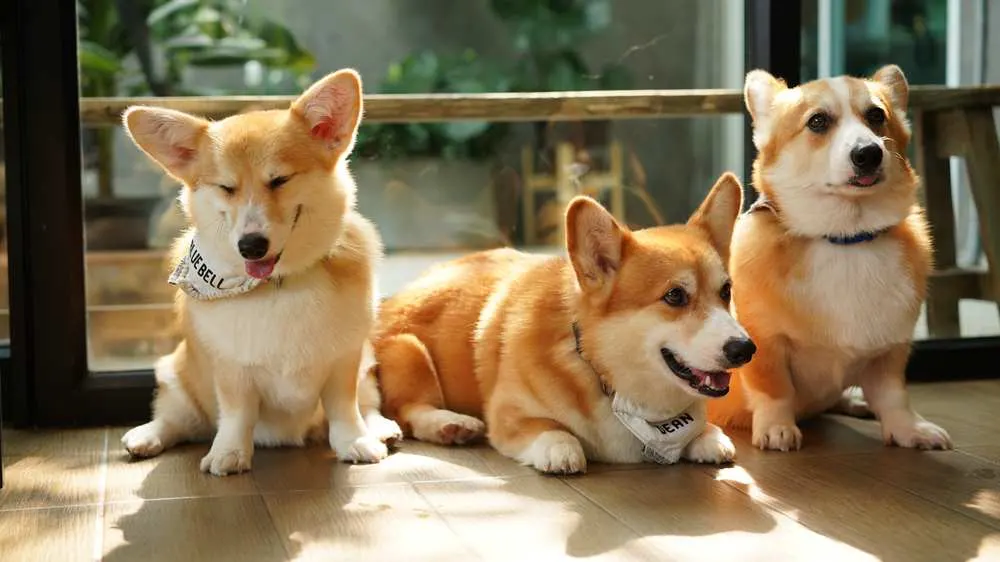Hiccups are super annoying; we all know that. Our four-legged friends have pretty much the same problem – they too have bouts of hiccups from time to time.
So if your question is: “Do Corgis hiccup?” – the answer is: “Yes, they do.”
Most of the time, it is not an issue. Quite the opposite, we are sure you will find it very cute. Your dog will experience a couple of minutes of hiccupping, you will have a good laugh at it, and soon enough, everything will be forgotten.
Can hiccuping become a problem? Are your Corgi’s hiccups sometimes a cause for concern? How much hiccuping is too much hiccuping?
Do not worry! We have answers to all of these questions. If you continue reading, you will learn what causes dog hiccups and how to best deal with them.
Let’s start!

What Causes Canine Hiccups?
All dogs, including Corgis, hiccup from time to time. Why? Just like humans, dogs hiccup when their diaphragm is irritated.
The mechanism is the same as in humans, too – the diaphragm is contracting and relaxing, creating involuntary short spasms. As a result, the person or a dog cannot establish a regular inhale/exhale breathing pattern while hiccuping.
Why Does Your Corgi Hiccup?
These are the most common reasons for canine hiccups:
- Eating or drinking water too fast: Some dogs, especially at a young age, tend to eat or drink too fast and thus ingest a lot of air with their food and water. It is thus important to feed a Corgi properly and with attention from the very start.
- Getting too excited: When a dog gets very excited, it starts yelping and can “swallow” a lot of air – that can cause hiccups too.
- Being under a lot of stress: Stress can cause some unusual reactions in dogs – besides a bout of hiccups reacting to stress can also lead to lip-licking or yawning.
Why Do Puppies Hiccup More Often Than Adult Dogs?
Puppies are far more prone to hiccuping than older Corgis. Why is that the case? We have consulted a couple of experienced veterinarians and came across different opinions.
One of the reasons mentioned is that puppies tend to eat and drink too fast. Some vets also thought that energetic play has a lot to do with this issue as well.
How can energetic play cause hiccups?
Puppies tend to play rather hard and then start breathing very rapidly, which often triggers hiccuping. If your Corgi is an energetic puppy that is constantly running, playing, and jumping, chances are he or she will hiccup a lot. Older dogs are usually calmer and thus less likely to get hiccups.
What Can You Do To Relieve Your Corgi’s Hiccups?
Hiccups are not always a cause for concern. Quite the opposite, most of the time, there is no need to react at all. You can lay back, enjoy the cuteness overload, and let nature take its course – hiccups will stop on their own soon enough.
If you notice that your Corgi is becoming upset or annoyed by constant hiccups, or you think they are lasting too long, you can try to stop temp by administering pretty much the same cures you use for people.
It might seem a bit unusual or even silly, but the best cure for relieving your Corgi’s hiccups is giving him or her a teaspoon full of honey. Alternatively, you can use maple syrup or even Karo syrup.
Do not worry; even though dogs are not allowed too much sugar, a small spoon of honey from time to time will not do any harm. Quite the opposite, these sugary syrups coat your Corgi’s throat soothing any irritations in that area. Besides, the sweet and sticky syrup will linger in your dog’s mouth long enough to distract him or her and help reinstate the normal breathing process.
Here is the detailed list of all the other hiccup remedies that can help your dog:
- Giving your hiccuping Corgi a few small sips of water
- Massaging your Corgi’s chest
- Taking your dog for a relaxing walk
All the methods come down to the same principles. You need to either distract your dog or help him, or her relax. In both scenarios, your dog will calm down and start breathing normally.
Read Also: How To Calm Down A Corgi? When Do Corgis Settle Down?

Can You Prevent Your Corgi’s Hiccups?
Now that you know what causes hiccups, it should be easy for you to prevent them. If your puppy or your adult Corgi are having a problem with frequent hiccups, try to slow down their eating and drinking as much as possible.
Hand-feeding a puppy one bite at a time will help, but it is very tiresome and time-consuming. It would thus be best to purchase a slow-feeding dish for your Corgi. Slow feeding bowls will not only help prevent frequent hiccups, but they will also help resolve specific digestive issues, including bloating.
Can Hiccups Endanger Your Corgi’s Health?
Hiccups will most probably not cause any health concerns, but that does not mean that there is absolutely no risk for your Corgi’s health. In some rare cases, adult dogs that experience frequent bouts of hiccups have an underlying condition.
What Are The Warning Signs?
If your dog has a bout of hiccups that lasts for more than an hour or has some additional symptoms, it would be best to visit a vet. The vet will decide if any treatment is needed.
Frequent and long-lasting hiccupping episodes can pair up with some breathing issues, and that is not a good thing! Such a situation should be taken seriously, and you should take your Corgi to the vet ASAP!
Pay attention and react immediately if hiccups are accompanied by:
- Coughing
- Sneezing
- Reverse sneezing
- Heavy breathing
Your veterinarian should be able to rule out asthma, pneumonia, or some other serious condition such as pericarditis.
Hiccups caused by exercise intolerance can also endanger your dog’s health. If you notice your Corgi becomes tired too quickly and starts breathing heavily, even after a short, slow walk, you should consult a vet and check for any underlying conditions.
Hot summer days are a perfect setting for hiccup episodes. Overexertion can trigger hiccups but also contribute to a severe and life-threatening condition – a heart stroke. Even though Corgis are not on the list of breeds of dogs susceptible to this dire condition, you should still be cautious.
There is yet another concerning tandem. Namely, when prolonged hiccuping pairs up with gastrointestinal issues such as constipation, vomiting, or diarrhea, you need to take your Corgi to your vet or the ER vet.

Conclusion
Although hiccups in dogs are usually not a cause for concern, it does not mean that you should not pay any attention to them. Being a good pet owner is just like being a good parent – you need to monitor your pooch at all times and react as soon as you notice any concerning symptoms.
As long as your Corgi is not hiccuping too often, you can feel free to enjoy the cuteness of it all and even make a video to remember those funny moments forever!

